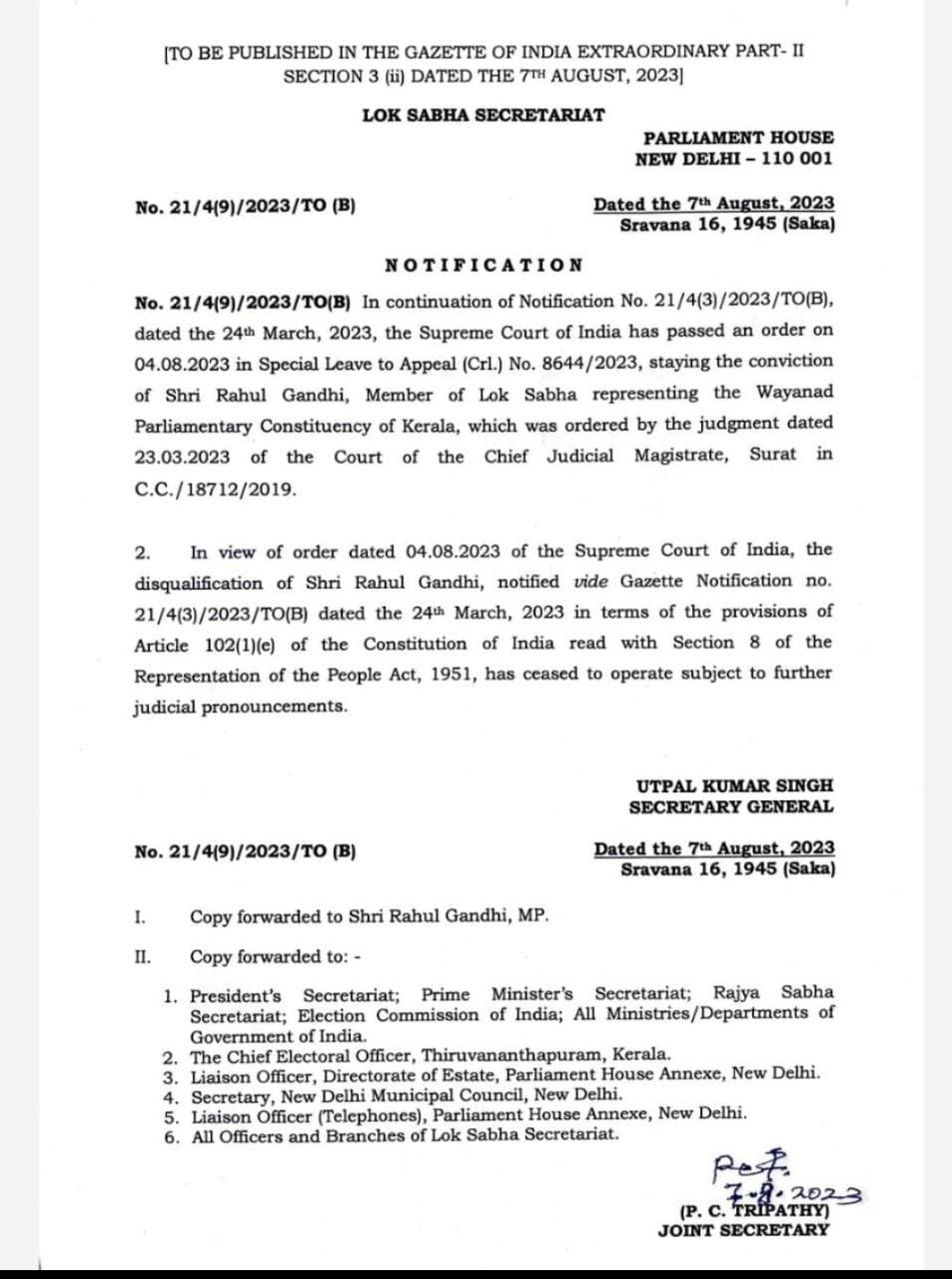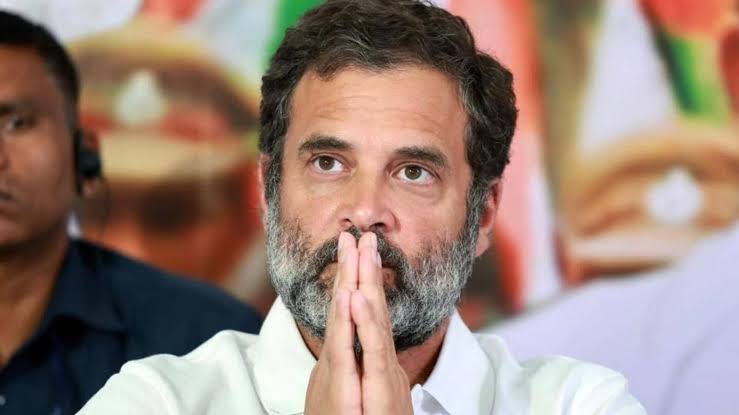The Lok Sabha Secretariat restored Congress leader Rahul Gandhi’s Lok Sabha membership on August 7, following Supreme Court’s August 4 order granting a stay on his conviction in the ‘Modi Surname Defamation Case.’
“No. 21/4(9)/2023/TO(B) In continuation of Notification No. 21/4(3)/2023/TO(B), dated the 24th March, 2023, the Supreme Court of India has passed an order on 04.08.2023 in Special Leave to Appeal (Crl.) No. 8644/2023, staying the conviction of Shri Rahul Gandhi, Member of Lok Sabha representing the Wayanad Parliamentary Constituency of Kerala, which was ordered by the judgment dated 23.03.2023 of the Court of the Chief Judicial Magistrate, Surat in C.C./18712/2019,” the Lok Sabha Secretariat’s notification read.
“In view of order dated 04.08.2023 of the Supreme Court of India, the disqualification of Shri Rahul Gandhi, notified vide Gazette Notification no. 21/4(3)/2023/TO(B) dated the 24th March, 2023 in terms of the provisions of Article 102(1)(e) of the Constitution of India read with Section 8 of the Representation of the People Act, 1951, has ceased to operate subject to further judicial pronouncements,” the notification added.

On March 24, the Lok Sabha Secretariat disqualified Rahul Gandhi as a Lok Sabha MP following Surat Court’s March 23 verdict convicting him in the Modi Surname Defamation Case. The Surat Court had sentenced the Congress leader to two years imprisonment for his allegedly defamatory remarks against the ‘Modi’ community, and thus, he was disqualified u/s 8(3) of the Representation of People Act of 1951.
Background
On August 4, the Supreme Court of India stayed the conviction of Rahul Gandhi for his remarks in the ‘Modi Surname Defamation Case.’ The court’s three-judge bench, comprising Justices BR Gavai, PS Narasimha and Sanjay Kumar, said that the trial court awarded the maximum sentence of two years without providing enough reasons for the same. The court said that if Rahul Gandhi’s sentence were a day lesser, the provisions would not have been attracted.
“The sentence for an offence punishable under Section 499 of the Indian Penal Code is maximum of two years of sentence or fine or both. The learned trial judge, in the order passed by him, has awarded the maximum sentence of two years. Except the admonition to the petitioner by this Court in a contempt proceeding, no other reason has been granted by the learned trial judge while imposing the maximum sentence of two years. It is to be noted that it is only on account of the maximum sentence of two years imposed by the learned trial judge that the provisions of Section 8(3) of the Representation of Peoples Act came into play. Had the sentence been a day lesser, then the provisions would not have attracted,” the court said.
“Particularly when the offence was non-compoundable, bailable and cognizable, the least which was expected from the learned trial judge was to give reasons for imposing the maximum punishment. Though the learned appellate court and the High Court have spent voluminous pages in rejecting the applications, these aspects are not seen considered,” the court added.
The court observed that Rahul Gandhi’s remarks were not in “good taste” and that a person in public life ought to exercise caution while making public speeches. The court accepted that the accused Congress MP ought to have been more careful.
The complainant’s counsel, Senior Advocate Mahesh Jethmalani, argued that the accused Congress MP was admonished by the Supreme Court. The counsel referred to the case where Rahul Gandhi attributed ‘chowkidar chor hai’ remarks to the Supreme Court. The counsel said that the accused, in the contempt case, had compounded his defamatory remarks. The counsel further argues it is well settled that an apology does not eradicate contempt but is an admission of guilt, rejecting the contentions that Rahul Gandhi has no prior convictions. However, Justice BR Gavai said, “Had this judgment come up earlier, your client (Rahul Gandhi) could have been more cautious.”
Furthermore, the Supreme Court said that Rahul Gandhi’s disqualification under the Representation of People Act does not affect the rights of the accused Congress MP but also of the electorate. The court further said that no reason had been assigned by the trial court to award the maximum sentence to Rahul Gandhi while staying his conviction. The court’s three-judge bench was hearing Rahul Gandhi’s challenge against Gujarat High Court’s July 7 verdict refusing to stay his conviction in the defamation case.


















Comments